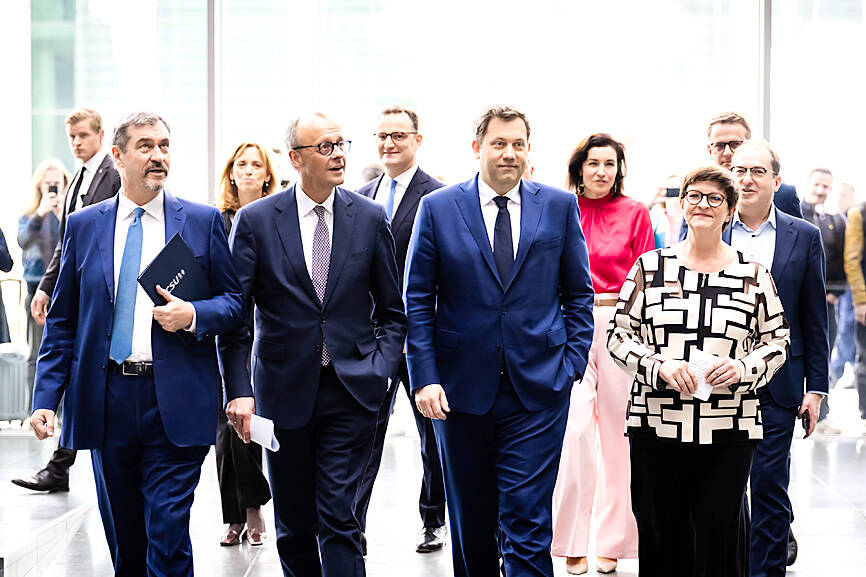Germany’s next leader, the conservative Friedrich Merz, vowed on Wednesday to “move the country forward again” by boosting the economy and defense as he presented a deal to launch his coalition government by early next month.
Merz is set to take over as leader of Europe’s top economy just as US President Donald Trump has sparked global trade turmoil and raised deep fears about transatlantic security ties.
Asked at a news conference if he had a message for Trump, Merz said in English that the country would meet its defense obligations and rebuild its economic competitiveness.

Photo: EPA-EFE
“Germany is back on track,” he added.
Following the February election victory of his Christian Democratic Union/Christian Social Union of Bavaria (CDU/CSU) alliance, Merz quickly struck a deal to forge a new government with the center-left Social Democratic Party (SPD) of the now-caretaker Chancellor Olaf Scholz.
“The coalition agreement is a signal of a new beginning... for our country,” said Merz, whose party won the elections with 28.5 percent of the vote.
In their 144-page coalition contract, the two parties pledged to “significantly” boost defense spending amid growing concerns about US commitment to European security under Trump.
The parties also said Germany would continue to support Ukraine as the US looks to encourage a deal to end the war started by Russia’s invasion over three years ago.
“We will provide comprehensive support to Ukraine so that it can effectively defend itself against the Russian aggressor and assert itself in negotiations,” the agreement said.
Presenting the deal, Merz pledged that Germany would “reform and invest to keep Germany stable, make it safer and make it economically stronger again,” adding that “Europe can rely on Germany.”
He also pledged that his government would “largely end irregular migration” and promised a “repatriation offensive” after an election campaign marked by a bitter debate on migration and a surge in support for the far-right Alternative for Germany (AfD).
The swift conclusion of the talks — a process that has in past years dragged on for months in Germany — is the result of “extraordinary external pressure,” said political scientist Wolfgang Schroeder of Kassel University.
“The pressure is coming from Trump, the pressure is coming from the AfD, the pressure is coming from [Merz’s] own ranks,” he told news channel NTV.
The far-right AfD came second in February’s election with a record 20 percent of the vote.
Support for the party has since continued to rise, with one survey by the Ipsos polling firm released on Wednesday rating it as Germany’s most popular party at 25 percent — ahead of the CDU/CSU at 24 percent.
Under the coalition deal, the conservatives are set to take over the foreign and economy ministries, while the SPD would get finance and defense, with German Minister of Defense Boris Pistorius widely expected to retain his position.
While the SPD plans to ask its members to sign off on the final deal, the CDU plans only to seek the approval of senior party figures.

Intelligence agents have recorded 510,000 instances of “controversial information” being spread online by the Chinese Communist Party (CCP) so far this year, the National Security Bureau (NSB) said in a report yesterday, as it warned of artificial intelligence (AI) being employed to generate destabilizing misinformation. The bureau submitted a written report to the Legislative Yuan in preparation for National Security Bureau Director-General Tsai Ming-yen’s (蔡明彥) appearance before the Foreign Affairs and National Defense Committee today. The CCP has been using cognitive warfare to divide Taiwanese society by commenting on controversial issues such as Taiwan Semiconductor Manufacturing Co’s (TSMC, 台積電) investments in the

HELPING HAND: The steering committee of the National Stabilization Fund is expected to hold a meeting to discuss how and when to utilize the fund to help buffer the sell-off The TAIEX plunged 2,065.87 points, or 9.7 percent, to close at 19,232.35 yesterday, the highest single-day percentage loss on record, as investors braced for US President Donald Trump’s tariffs after an extended holiday weekend. Amid the pessimistic atmosphere, 945 listed companies led by large-cap stocks — including Taiwan Semiconductor Manufacturing Co (TSMC, 台積電), Hon Hai Precision Industry Co (鴻海精密) and Largan Precision Co (大立光) — fell by the daily maximum of 10 percent at the close, Taiwan Stock Exchange data showed. The number of listed companies ending limit-down set a new record, the exchange said. The TAIEX plunged by daily maxiumu in just

‘COMPREHENSIVE PLAN’: Lin Chia-lung said that the government was ready to talk about a variety of issues, including investment in and purchases from the US The National Stabilization Fund (NSF) yesterday announced that it would step in to staunch stock market losses for the ninth time in the nation’s history. An NSF board meeting, originally scheduled for Monday next week, was moved to yesterday after stocks plummeted in the wake of US President Donald Trump’s announcement of 32 percent tariffs on Taiwan on Wednesday last week. Board members voted to support the stock market with the NT$500 billion (US$15.15 billion) fund, with injections of funds to begin as soon as today. The NSF in 2000 injected NT$120 billion to stabilize stocks, the most ever. The lowest amount it

INVESTIGATION: The case is the latest instance of a DPP figure being implicated in an espionage network accused of allegedly leaking information to Chinese intelligence Democratic Progressive Party (DPP) member Ho Jen-chieh (何仁傑) was detained and held incommunicado yesterday on suspicion of spying for China during his tenure as assistant to then-minister of foreign affairs Joseph Wu (吳釗燮). The Taipei District Prosecutors’ Office said Ho was implicated during its investigation into alleged spying activities by former Presidential Office consultant Wu Shang-yu (吳尚雨). Prosecutors said there is reason to believe Ho breached the National Security Act (國家安全法) by leaking classified Ministry of Foreign Affairs information to Chinese intelligence. Following interrogation, prosecutors petitioned the Taipei District Court to detain Ho, citing concerns over potential collusion or tampering of evidence. The